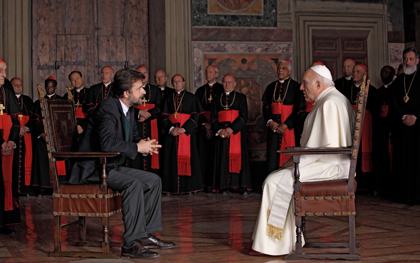Primary navigation

Italy / France 2011

Reviewed by Catherine Wheatley
Our synopses give away the plot in full, including surprise twists.
Vatican City, the present. The pope has died. The cardinals gather to elect his successor, and Cardinal Melville is chosen. The announcement of ‘Habemus Papam’ (‘We have a Pope’) goes out to the crowds outside the Vatican, but Melville fails to appear. Wailing to the other cardinals that he isn’t up to job, he flees. Taking this to be a simple case of nerves, the cardinals announce that the new Pope has retired to pray before greeting the people. But Melville is intractable. A psychoanalyst, Professor Bruzzi, is called in. His efforts are thwarted by the cardinals, and he recommends that Melville see another doctor in private, suggesting his estranged wife. Bruzzi is told that he, like the cardinals, will be confined to the Vatican, his mobile confiscated, until the matter is resolved.
Melville is smuggled out for his doctor’s appointment by the Vatican spokesman, but runs away immediately afterwards. He wanders the streets of Rome, takes a room in a hotel and meets a troupe of actors rehearsing Chekov’s The Seagull. Back at the Vatican, the spokesman concocts an elaborate story to cover up Melville’s absence. When the spokesman realises after three days that Melville has no intention of returning, he confesses his deceit to the cardinals. They set out to find Melville, capturing him at The Seagull’s opening night.
The new Pope is presented to the world, but explains to the gathered crowds that he cannot – and will not – perform the role for which God has chosen him.
Nanni Moretti’s tragi-comic story of a newly elected pope on the run is no toothless satire of organised religion, says Catherine Wheatley, but a bittersweet portrait of age, fate and fallibility
“My heart is blighted, and withered like grass; I forget to eat my food. I lie awake; I have become like a bird alone on a roof.” With these words, taken from Psalm 102, Nanni Moretti’s erudite psychoanalyst Bruzzi attempts to convince an audience of cardinals that the Bible discusses depression. Certainly this prayer for an afflicted man eloquently captures the symptoms of the newly elected Pope, who himself claims to be suffering from “psychological sinusitis”. But Bruzzi’s words fall on deaf ears; after all, he is told, “The soul and the subconscious cannot possibly coexist.”
Even at the end of Moretti’s Habemus Papam it’s not entirely clear if the Supreme Pontiff, formerly known as Cardinal Melville, is suffering from a nervous breakdown, an existential crisis or a loss of faith. But as he awaits presentation to the waiting world, his anguished howl for help reveals that, soul or subconscious, he is a man in torment. Fleeing the faithful for the crowded streets of Rome, convinced that he lacks the gifts God sees in him, he wanders aimlessly and anonymously in search of clarity. Meanwhile, confined to quarters until the Catholic leader can be found and announced to his public, the cardinals and Bruzzi – who has unwittingly found himself party to events – tussle over evolution and creationism.
The two narrative strands offer farce on the one hand, tragedy on the other. In the Vatican, the supremely confident man of science chides the craggy, jowly cardinals for their overreliance on frothy coffees and prescription meds, corralling them into a volleyball tournament. Outside its walls, the anxious man of God weaves his way along the edge of a spiritual precipice, delighting in a performance of Chekov’s The Seagull yet despairing of any long-term potential for personal flight. Yet in the wake of Moretti’s previous effort, the Berlusconi-baiting satire The Caiman (2006), some have lambasted Habemus Papam’s approach to organised religion as toothless.
One can see why, as this is an altogether more ambivalent film – one that seems as much (if not more) a meditation on the guilt, regret and shame that come with age and acquired wisdom as a pillorying of orthodox hypocrisy. But isn’t that the point? As the votes for Pope are cast, a cacophony of prayers echoes through the Vatican’s cavernous halls, as each of the cardinals desperately pleads that he not be the chosen one. Time and again the refrain “I can’t” is uttered, and even Bruzzi must eventually admit his fallibility.

At the film’s beautifully choreographed and extremely sinister climax, Melville accepts, with devastating grace, that his fate is inescapable, and faces his demons – and his public – with dignity. It’s a bittersweet finale, all the more distressing for the film’s levity elsewhere, but it’s one that rises above cheap shots and, through its very uncertainty about what it wants to say, what it is, offers a kind of emotional honesty.
As Melville, 85-year-old Michel Piccoli – once so very virile and lusty – is racked with self-doubt, his Giaconda smile belied by the darting, desperate eyes above it. Kindly, considered, decent, he is a far cry from the corrupt clergymen who populate so many caustic satires on the Catholic Church. This is someone whose fall from grace seems entirely undeserved, and who is all the more pitiful for it. Dwarfed by the sheer scale of his spectacular surroundings, crumpling under the twin burdens of expectation and history, Melville quite literally carries the weight of the world on his shoulders. Small wonder he’s crippled by it.
Nanni Moretti talks to Nick James in the January 2012 issue of Sight & Sound
The sacred and profane: Barbara Wurm blogs about Romuald Karmakar’s Catholic documentary The Flock of the Lord at the Venice Film Festival (September 2011)
Oedipus and Elektra cruise the Croisette: Geoff Andrew blogs about sexual tensions in a spate of films at Cannes (May 2011)
Mobsters and maestros: Nick Hasted on a new generation of Italian filmmakers emerging from under the weight of the past (May 2010)
No sex please, we’re Italian comedians: Nanni Moretti talks to Geoffrey Macnab about his starring role in Quiet Chaos (November 2008)
El baño del Papa reviewed by Michael Brooke (August 2008)
Amen reviewed by Geoffrey Macnab (August 2002)
Aprile reviewed by Chris Wagstaff (April 1999)